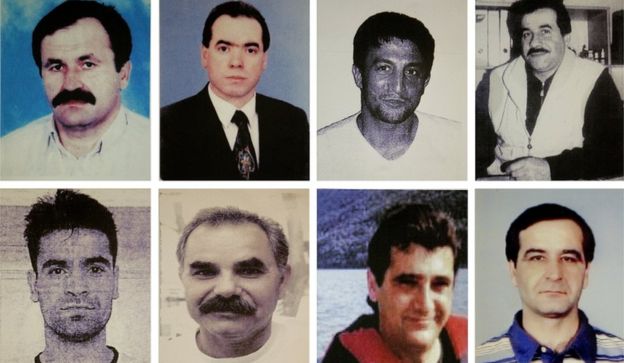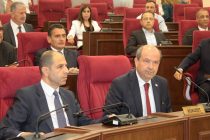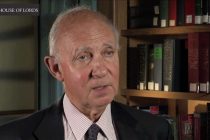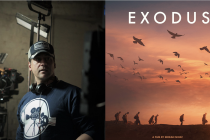Beate Zschäpe has been found guilty of ten racially-motivated murders by a German court. A five-year trial determined that she was a member of a neo-Nazi gang behind the murder of eight Turks, one Greek, and a German policewoman between 2000 and 2007. The Munich state court’s verdict, given on Wednesday 11 July, carries an automatic life sentence.
Throughout the trial Zschäpe, 43, had maintained that two male accomplices, Uwe Mundlos and Uwe Böhnhardt, both deceased, were behind the racist killing spree. Her defence lawyer said she would appeal against the sentence.
The connection between the murders was made by chance in 2011, after a botched robbery in Eisenach led to the neo-Nazi group’s discovery and their trail of horrific crimes.
Zschäpe shared a flat in the East German town of Zwickau with Mundlos and Böhnhardt after going on the run together in 1998. The trio had formed a right-wing terrorist cell called the National Socialist Underground (NSU), which targeted foreigners in Germany and committed other violent crimes to sustain themselves.
Racists killers: Beate Zschäpe, Uwe Mundlos & Uwe Böhnhardt had formed right-wing terror group the National Socialist Underground (NSU)
The bodies of Mundlos and Böhnhardt were found in a burnt-out motorhome used in the failed robbery on 4 November 2011, the result of an apparent suicide pact. In a desperate bid to destroy evidence, Zschäpe set off an explosion in their shared home. However, multiple pieces of proof, including a video linking the suspects to the murders, were found in the rubble. Zschäpe later turned herself in to the authorities and became the main defendant on trial, but has said little about the crimes.
“Unfortunately, the verdict given did not reveal the background of the NSU murders, and the affiliation between the deep state and intelligence”
Four other defendants were also given jail terms on Wednesday. Ralf Wohlleben was found guilty of aiding and abetting murder by procuring the handgun for the gang and sentenced to 10 years. Carsten Schultze, then a teenager, was found guilty of delivering weapons to the gang and jailed for three years. Holger Gerlach and André Eminger received three years and two-and-a-half years respectively for their role in assisting the terrorist group.
The court’s ruling on the sentences of the four – far shorter than those demanded by state prosecutors – were greeted with cheers and clapping from fellow right-wing supporters present in the courtroom, but slammed by relatives of the victims and the Turkish government.
Beate Zschäpe gets life for her role in killing 8 German Turks, 1 German Greek and 1 German police officer
Gamze Kubaşık, the daughter of Mehmet Kubaşık who was killed by the NSU in 2006, told reporters: “I am extremely disappointed and extremely sad about the lighter sentences for the NSU’s supporters Andre Emminger and Ralf Wohlleben.”
İsmail Yozgat, whose 21-year-old son was also murdered by the NSU in 2006, criticised the verdicts and the German government. He had expected more from the authorities after Chancellor Merkel’s pledge to the relatives of victims to investigate the role of the German intelligence agencies in the serial killings. He told reporters outside the courtroom, “We do not accept this ruling.”
A statement issued by the Turkish Foreign Ministry was also scathing of the German authorities:
“Unfortunately, the verdict given today did not reveal the background of the NSU murders, and the full scope of dimensions in the affiliation between the deep state and intelligence went unrevealed, as the real criminals remain in the dark.”
Investigations following Mundlos and Böhnhardt’s 2011 deaths linked the NSU to 10 murders, two bomb attacks in Cologne, which left more than 20 people injured, and 15 bank robberies.
The first NSU victim died on 11 September 2000, the last one on 6 April 2006. The murder victims, mainly ethnic Turks, were usually killed at their place of work and all with a CZ 83 handgun. It led to the German media dubbing the suspects as the ‘Kebab Killers’, playing off a stereotype associated with Turkish immigrants.
The NSU case not only uncovered police incompetence and prejudice, but also collusion between the German state & neo-Nazis
At the time, German police were adamant the murders were unconnected. Despite the objections of relatives, the police asserted that the victims were involved with criminality, such as drug-dealing, and were most likely murdered by Turkish and Kurdish mafia. The police were also quick to rule out racism as a motive.
The NSU case not only uncovered huge police incompetence and prejudice against the victims, but also collusion between the German state and neo-Nazis. The findings were captured in a three-part television docudrama called In The Middle Of Germany that sent shockwaves when it was first broadcast in 2015.
The TV drama showed Germany’s domestic intelligence agency the BfV controversially tolerating neo-Nazis, believing they could be controlled through a network of informers. It also highlighted how key evidence was shredded at the behest of the intelligence agency during the police investigations and again after the discovery of Mundlos and Böhnhardt’s dead bodies, raising further suspicions about collusion between members of the German state and far-right extremists.
It is highly likely many more people had assisted the terror trio in not only committing their crimes, but also avoiding capture for over a decade
Yet the authorities maintain they had no prior information about the NSU cell and its suspected role in the killings. The claims remain unconvincing, with German politicians and lawyers of the victims challenging BfV’s account. Opponents claim it is highly likely many more people had assisted the terror trio in not only committing their crimes, but also avoiding capture for over a decade.
Ex-German MP Clemens Binninger had been a member of one Bundestag committee of inquiry into the NSU case. He was among those to air his doubts: “Within the trio, did the two men commit all these crimes alone, without leaving a trace anywhere?”
On 23 February 2012, Chancellor Angela Merkel had made a public promise at a commemoration service to remember the victims of the NSU murders. She said the German authorities were, “Doing everything to solve the murders, uncover the accomplices and individuals behind these crimes, and bring all perpetrators to justice.”
Relatives of NSU’s first victim Enver Şimşek give a press conference a day after the verdicts
Six years on, those words will ring hollow for the survivors and relatives of victims of NSU’s attacks. And with key state documents remaining under lock and key for the foreseeable future, it is likely the many serious questions relating to NSU’s crimes and the state’s involvement will remain unresolved.
Main photo above from a German police hand out of eight of the ten NSU victims: (top, L-R) Enver Simsek, Abdurrahim Ozudogru, Suleyman Taskopru and Habil Kilic and (bottom, L-R) Yunus Turgut, Ismail Yasar, Theodorus Boulgarides, and Mehmet Kubasik





